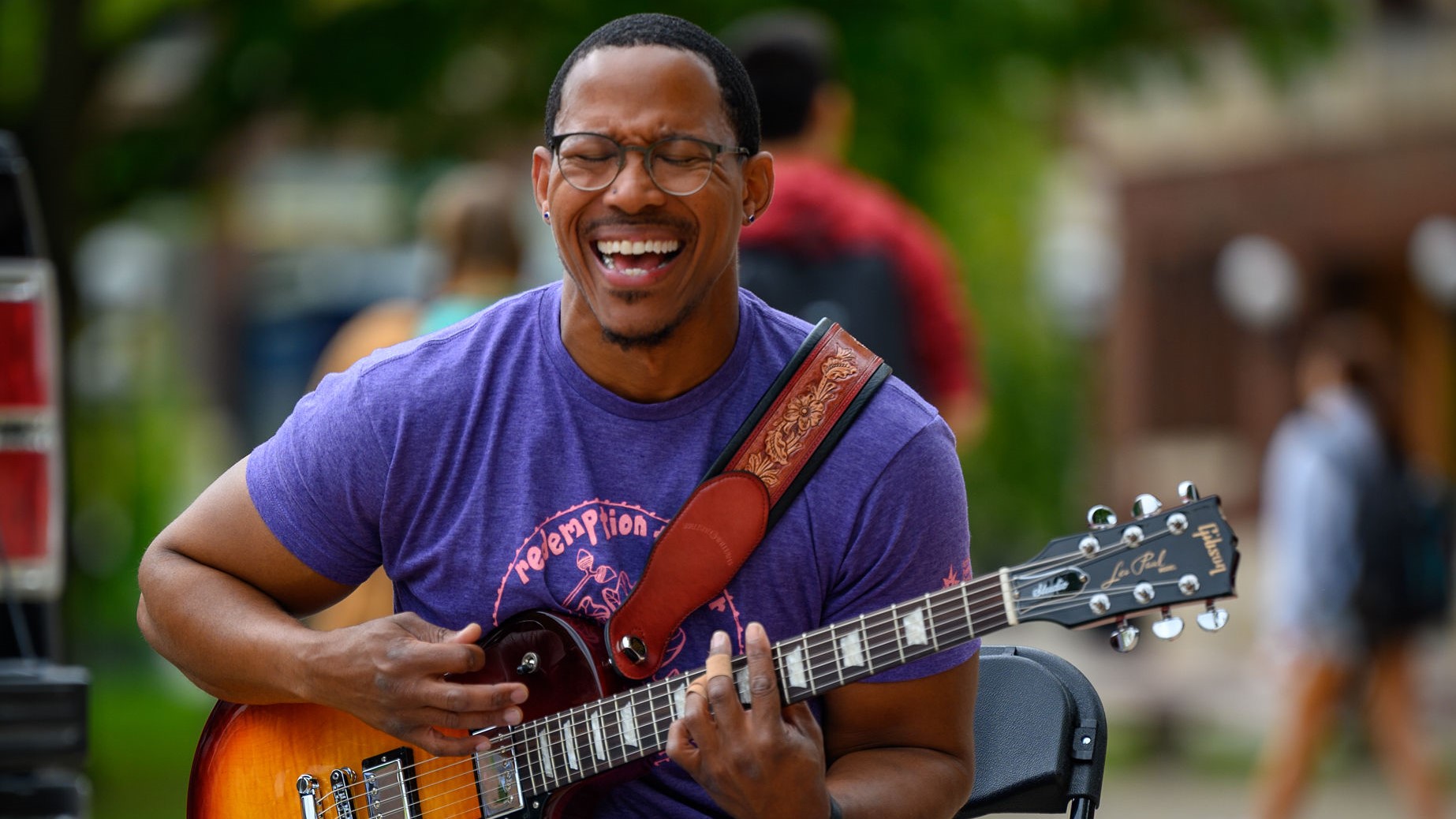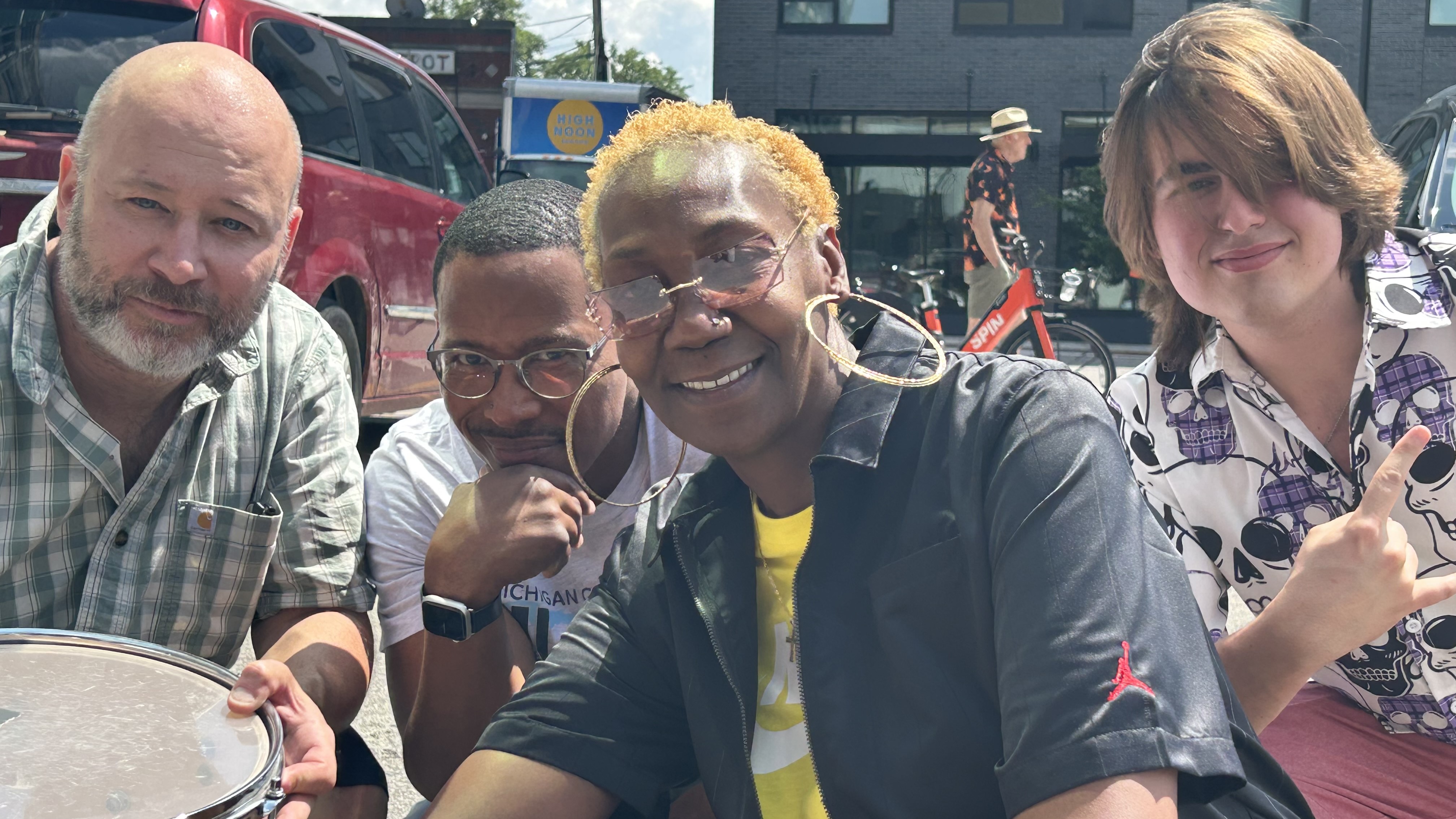
Cozine Welch, a statewide organizer with the AFSC Michigan Criminal Justice Program.
In Michigan, AFSC is leading a large coalition supporting people serving long sentences. We’re urging lawmakers to adopt Second Look legislation that would allow judges to reexamine a person’s sentence after they’ve served ten years.
And now, AFSC Michigan has a band, A2L, to back it up! One member is Cozine Welch, a statewide organizer for AFSC. He’s a poet, songwriter, educator and editor who served nearly 20 years in prison before his release in 2017. Cozine shares his thoughts about the band.
Q: How did the band begin?
We were gifted with the opportunity to have some stage space at the Ann Arbor Art Fair, in conjunction with the Prisoner Creative Arts Project (PCAP) at the University of Michigan. Our initial goal was simply to have some folks who had either served long or indeterminate sentences and had been released -- or other folks who were advocating for them -- and give each person a chance to speak on what Second Look legislation would mean for them.
Then we realized that myself (guitar), Pete Martel (associate program director on drums) and Skylar Gillette (intern on bass guitar) all played instruments. Wow, what a coincidence! And somehow the conversation got around to how I had taught myself how to play guitar inside and wrote some songs. I’d been active with PCAP for 11 years and had connections with them.
My songs focused on life inside and stories of folks when they came home. What has changed? I like how this song, Burn My Bones, fits with Second Look Legislation. I wrote it when I was 29 and still had the prospect of 11 more years of incarceration. But the internal change that makes you a different person –that had already happened for me. And I had to sit in prison for another decade or more? I’d paid my debt.
So I sang this song in the office and Pete’s eyes just lit up. He was like, “Oh, well, we gotta do that tomorrow” at the art fair. We had a guitar in the office, so I was able to play the rhythms. Next thing I knew, we've got a drum set and we're practicing for the event.
It was such an immediate hit. It was an impromptu, just “go with the feeling” thing, and people were coming up to us afterwards asking more about Second Look. There was just so much interest that it sparked a light bulb for us -- this song and its message reached people in a way that words alone might not have.
Q: What is music’s role in movements?
We got to thinking about all of our major civic movements that we study and appreciate so much. And one of the things that we notice has been missing in this generation is that cultural attachment. That thing that went across whether or not you were from Southfield or Oak Park or New Jersey or Southampton, right?
That music resonated in the message, and it helped you remember you had a consensus goal among you all for something better. And that's just how it started and caught momentum with us here in the office --and how it's catching momentum out there, every time we go and perform.
The band is awesome, and it really serves to supplement the message. Still our primary concern is getting out our main message at events like our lobby day, speaking with legislators, and doing media interviews.
But it's really great to be able to bring music in. We did an event in Flint not long ago, and the same thing happened. I took the guitar up there, played the song, and it resonated. Afterwards, people wanted to know, “What is Second Look?” So we passed out our cards.
At the Ann Arbor event, a woman said the music reminds us that there are human beings behind those prison walls. Music is something we associate with gentle, real souls. Music is created from a place of real goodness – and yet this music comes from a confined space. She was saying it’s just more proof that there are humans inside who we’re forgetting about.

From left, AFSC Michigan staff and band members Pete Martel, Cozine Welch, Lawanda Hollister and Skylar Gillette
Q: What’s this mean for you?
I love the perspective that the people who we're speaking of, who we’re fighting for, are human beings with very often complex emotions and experiences. People in prison were victims before they became classified as victimizers.
We didn't go to prison out of a vacuum. We grew up in societies and environments – our experiences put us on a trajectory. But we’re still humans. We realize through the power of song that the barriers and gaps we face are just constructs. We can tear them down.
It’s important to show folks that when it comes to passing legislation and having a real effect, this is not one dimensional work. You have to reach out to people where they are. Storytelling is important, but sometimes you need a soundtrack to really help.
Q: What’s next?
We’re putting together an information session that will include actual testimonials from folks who’ve come home and those who have loved ones still inside. We’ll have music interweaving with poetry and spoken word.
I want to add that our band has four members. We have a guest star -- our colleague Lawanda Hollister, also a formerly incarcerated person and statewide organizer for AFSC. At the Ann Arbor Arts Fair, Lawanda fronted the band and invited other formerly incarcerated people and loved ones to share their experiences from the stage. It was awesome.
P.S. According to AFSC Archivist Don Davis, A2L is likely AFSC’s first “house band.” A Robert Cray video featured AFSC’s Eyes Wide Open exhibit several years ago, and AFSC has been associated with several famous musicians over the years, including Bonnie Raitt and Joan Baez. But this Michigan band is all AFSC!